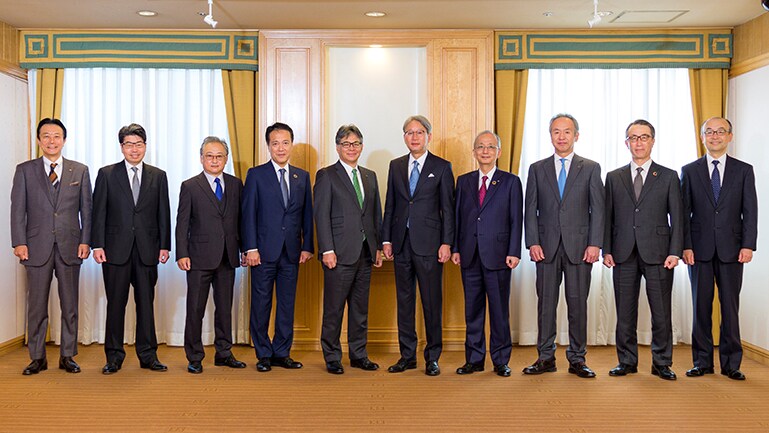
Strengths of and issues facing Japanese companies taking on the challenge of decarbonisation in Asia
2022-12-23
The Executive Sustainability Forum holds first meeting
The Executive Sustainability Forum held its first meeting in Tokyo on 24 November 2022 with 11 Japanese executives working on sustainability management. The participants discussed issues in bringing about sustainable economic growth in Asia, as well as the strengths and roles of Japanese corporations in working on decarbonisation in Asia.
The forum started under the mutual understanding that countries must resolutely share the goal of sustainability and take measures that accommodate local circumstances to achieve sustainable growth in Asia. Even though growing populations are supporting economic growth in Asia including ASEAN and India, companies are facing increasing responsibility to shift their existing business models to work on reducing greenhouse gas emissions as the move for decarbonisation accelerates. This requires companies to come up with sustainability management models that will achieve both sustainability and economic growth to boost their competitiveness in the long term. Action for climate change can no longer wait, and this situation has intensified the need for Japan to take initiatives in organising environment-related technologies and rules, and to explore realistic solutions in collaboration with industry, government and academia across Asia.
At the meeting, the PwC Japan Group first outlined the results of a survey on decarbonisation issues in Asia and the roles Japan can play. Adopted in 2015, the Paris Agreement set ‘ to limit global warming to well below 2, preferably to 1.5 degrees Celsius, compared to pre-industrial levels’ as a shared worldwide target. To achieve this target, the world needs to reduce carbon emissions by a total of 12.9% a year to achieve this target. However, in 2020, the reality was that in Asia, only a reduction of 0.9% was achieved.

Decarbonisation is difficult in Asia, from both supply and demand perspectives. In terms of demand, Asia is currently serving as the world's manufacturing plant, with its populations and economies set to grow in the years ahead, which will obviously increase demand for more energy. Supply issues exist as well. First, since Asia’s existing coal power stations have only been operating for about one-third the length of time that similar stations in the EU and the US have, depreciation concerns and other related factors makes it difficult for them to be immediately shut down. Next, even if Asia's energy is to be replaced with renewable energy, Asia geographically lacks sufficient resources for renewable energy, with many countries experiencing massive rainfalls in rainy seasons and having an unsteady supply of wind power. In addition, state subsidies and tax benefits to encourage the shift to renewable energy have not been sufficiently established in Asian countries. Investment to promote technological innovations is also insufficient compared with that of advanced nations. For these reasons, the forum suggested that Japanese corporations with strengths in related technologies and financing know-how could proactively get involved to help with some of these issues.
Next, the participating executives talked about their decarbonisation initiatives and their take on the Asian market’s prospects, based on the topics of the survey. Some corporations explained feeling that decarbonisation initiatives in Asia could help to improve their corporate brand value; meanwhile, others suggested introducing a ‘circular society’ system to other Asian countries. The executives also spoke of technological investment and investing in projects, and expectations for rapid growth through channels such as M&A.
At the same time, to make these ideas a reality, they also raised the need to develop innovations and start-ups from a business point of view, and the need for the capability to appropriately evaluate technologies that could bring social impact not only traditional financial analysis from a financial point of view. They also talked of the importance of supporting SMEs and medium-sized companies, all agreeing that a business transition equivalent to the industrial revolution is an imminent necessity, and bringing in partners with common goals is vital for commercialisation.
Sustainable growth must see the three elements of technology, funding and government policies working in a positive cycle. Implementing technologies requires funding, and the appropriate circulation of funds requires government policies. The participants agreed that to bring about this positive cycle: (1) An ambitious vision is needed for Japan to contribute to the world; (2) the vision must be supported by Japan's strengths; (3) concrete plans should be developed by using technological expertise and facts; (4) various players should work together to implement the plans and (5) detailed and proactive public communication is a must.
In addition to decarbonisation, the circular economy, biodiversity and the financial divide were raised as examples of areas for future discussion. The forum declared its aim to achieve both sustainability and growth, and agreed to discuss areas where Japanese corporations can leverage their strengths to build new business models and strengthen competitiveness in the future. With regard to regions to cover, the forum decided to first focus on Asia, which was the subject of this forum, but to evaluate broader regions as well.
For the next meeting, the participating executives agreed to focus on the concept of the grand design of a circular economy, which is an especially fitting goal for Japan as a country with scarce resources, evaluating the specific approaches and platforms to be used in view of expected growth, a decarbonised society and resilience improvement against geopolitical risks, and work toward putting together a proposal to disseminate to the world in the future.
A positive cycle that can achieve both decarbonisation and economic growth can only be achieved with input from diverse stakeholders. The forum will continue to explore the best solutions for creating a sustainable world by exchanging views with the executives of companies running wide-ranging businesses, in consideration of Asia's unique situations that differ from those in Western countries, disseminating their proposals to the world to make the world sustainable through private-sector initiatives.



